|
ORGANIC OR NOT written by Peter Somers of THE HONEY STOP in Salt Lake City, UT Honeybees can fly over eight miles from the hive to gather quality nectar. The average distance is about 2 miles, & 1 .8 miles is the distance recommended for the establishment of an organic forage zone. The National Organic Standards Board (NOSB) acknowleges that bees will travel beyond this zone "even in well-managed operations with sufficient forage in the forage zone." USDA organic means 95% organic, but there is no mention of how this is being calculated in the case of foraging honeybees. And why is this distance only a recommendation? The National Organic Program was launched over a decade ago, but the USDA still does not have organic standards for honey. They have them for livestock, & these are the standards by which third party agents have been certifying honey. It's better than nothing, but cows don't usually fly from their pasture in search of greener grass. Specific behavior by honeybees calls for specific standards for organic certification. Places like Europe & Canada have honey standards. But consider this excerpt from the US Code of Federal Regulations: "...there are no existing programs that require the official inspection & certification of honey." If you're not confused, then eat more honey. Healthy, active minds should all be confused at this point. It has been the task of the NOSB to develop organic certification laws for beekeepers. But their proposals have not been accepted into regulation & will remain recommendations until approved by the USDA. Blame it on the speed at which the organic market has been growing, or the bureaucratic clown party that often ties these things up. Is corruption to blame? Conflicts of interest? The Cornucopia Institute reported last year that "an employee of General Mills, a $1.5 billion agribusiness, held the scientist's slot on the board, & an employee of another big agribusiness, Organic Valley, held one of the four farmer slots." Suppose the USDA finally did adopt organic honey standards into regulation. This would hardly ensure organic honey. In 2008, 15 of 30 federally accredited certifiers were placed on probation for violations of USDA organic standards. And if you're a small business with annual revenues below $5,000, you are exempt from organic certification requirements. You don't need Bill Lumbergh nosing around your operation with his clipboard & bottle of hand sanitizer. It's organic if you say it is. Beekeepers have shared reverence for the environment long before sustainable farming became the need of the hour. However, to demonstrate that the land you don't own is organic for miles around & that every water source is pure may not always be practical. Most organic honey is imported by developing countries, such as Mexico & Brazil. To be worthy of the USDA seal, the honey must meet its own country's organic honey standards, as well as our own. But, we don't have any such standards. The faith lies with the foreign government's certification process. Don't stop buying organic honey if that is your preference. Your purchase demonstrates increasing consumer demand for responsible & sustainable agricultural practices. And that is a very good thing. But, understand the seal. And take your grain of salt with a drop of golden honey. Preferably Cold Extracted. Addendum: By Aaron of Living Honey Due to the proximity of Living Honey Apiaries to our Utah communities, we don't attempt to officially certify or self certify our "Living Honey" as organic as we feel the label to be somewhat meaningless in light of the info presented above. To add insult to injury, many beekeepers or packagers then go on to heat their honey, effectively destroying the "ORGANIC HONEY" that they worked so hard to gather in the first place. Despite the fact that we don't certify our honey to be organic, we are of the opinion that our bees are foraging from the wild flowers of the rocky mountain foothills & gathering wonderful & healthy nectar for your enjoyment. And of course our honey is never heated. Based upon these factors, it is finally left up to you, the consumer to get to know your beekeeper to the best of your ability so that you can, in the end, have confidence that you are getting the best honey possible.
2 Comments
I have been fielding many questions of late about the differences between our Liquid and Crystallized honey.
Nutritionally, there is no difference. When honey is first extracted from the hive, it is always in its liquid form. From that point forward, the honey will begin to crystallize at a rate that is dependant upon the flowers that the bees gather their nectar from, the storage temperature of the honey, the moisture content, & other factors. I've heard of honey that will crystallize in as little as a week or 2 from the extraction date, and I have some honey that after 2 years still shows no signs of crystallization. For our Utah honey, the time frame seems to be 4-8 months on average. For that reason, we are not always able to offer a liquid honey year around. Crystallization basically occurs due to the sugar molecules attaching to pollens or other small impurities in the honey, and once the process begins it continues until the the entire container of honey is crystallized. Honey that has been pasteurized &/or filtered removes nearly everything (including nutrients) that the sugars could attach to and therefore can sit on a store shelf without crystallization for years before it would eventually crystallize. Yes, pasteurized honey will still crystallize, but it takes a lot longer. The savvy honey consumer will recognize that crystallized honey is only one indication that their honey is raw and Cold Extracted, but not the only indicator. It is therefore important to recognize that if you are going to be consuming completely natural & untampered honey, you will almost unavoidably be dealing with crystallized honey either a little or a lot. Many people actually prefer eating and enjoying the crystallized honey. For those who prefer their honey to be in its liquid state there are some prudent ways to reliquify your honey without damaging the delicate enzymes and nutrients that are constantly being damaged during commercial heating & packaging. Method #1 (and my favorite) is to put your honey out in the sun for an afternoon & let the warmth slowly reliquify your honey. Method #2 is to put your honey into a large pot of water on low heat until the temperature is uncomfortable for your hand. Then turn it off, or monitor at that temperature until the heat has slowly reliquified your honey. Method #3 - If your oven has a "Warming" feature, put your honey in the oven at about 110-115 degrees for several hours monitoring till reliquified. Never use a microwave!! You will notice that all of the methods above can take a few hours. If it only takes you 15 minutes to reliquify your honey, the temperatures were almost certainly too hot. When using any of the above methods shake the honey bottle on occasion to even out the temperature of the honey throughout the bottle. Remember that you can damage your honey as easily as any honey packager can by getting it too hot. If you have been shy about purchasing or using crystallized honey, I hope that this new information will give you the confidence to purchase and use some of our beautiful crystallized honey. Have you ever wondered why some honey is light, and some dark?
As a general rule, Americans tend to prefer light honey as it typically has a lighter, less intense flavor, while Europeans tend to prefer the more intense flavors in dark honey. I have probably been a typical American in that I have also preferred light honey over the years. However, due to every extraction of honey producing unique & interesting flavors, I have discovered that my preference has been shifting to enjoyment of darker honey. (Interestingly, this has also coincided with a preference for dark chocolate.) I hadn't really given much thought as to why some honey was dark, & some light prior to this year. I assumed it was mostly controlled by the bloom. But I received some new insight this year. Why? Because nearly all of our honey was darker this year than prior years. The other thing that was different this year was that it was very, very dry. While Utah is not known for humidity, we had much less humidity than typical. I realized that the connection was in the nectar flow of flowers. Its not hard to imagine that when there is more humidity, the nectar flows much faster. But when it is dry, the slow flow of nectar has a higher percentage of pollen, nutrients & flavor compounds. Thereby creating a darker, more flavorful honey. So, while our volume of honey is down this year, the flavor is definitely UP! Enjoy!! Milk??
Why would I take the time or effort to discuss milk in a Honey blog? Great question - Let me tell my story. Like most everyone else, I have been drinking and enjoying store bought pasteurized milk for a lifetime. Unlike most everyone else, I have been enjoying cold extracted Raw honey for that same lifetime. Problem was, I didn't really appreciate the honey until this last couple of years when I discovered that the honey that everyone else consumes is pasteurized, dead and tasteless. During the time I began to research and realize that we were providing a very amazing product, I was talking to a neighbor who had recently bought a milking cow. I was intrigued by getting a higher quality of milk and began milking "Bessie" 1 day per week. The 1st question that came up was whether I was going to pasteurize the milk prior to consuming. My neighbor did, but wasn't sure why. So I Googled it! Wow, what a wealth of information and controversy that sprang into view. Fortunately for me, I already knew that unheated honey was far superior and had no problem believing that unheated milk would also be far superior. Milk seems to be very similar to honey. It is loaded with probiotics, enzymes and other living nutrients that get killed, damaged or changed by pasteurization. Since then I have never heated my milk once. The flavor, health benefits and quality are out of this world and I absolutely love my milk. I hope I never have to go back to pasteurized milk. I'm grateful for these new findings in my life. I now feel like i'm living in a land flowing with Milk and Honey. Awesome!! I look forward to discovering the next hidden gem of knowledge. I've had several customers amazed at how delicious & complex the flavors are in our honey. Some have asked me why ours is so much better than other honey?
That is a loaded question, but I think I can offer some compelling ideas. Of course, I will first remind you that our honey is never heated or filtered which keeps many of the delicate flavors intact. This has been well discussed throughout our web site. But is there anything else? Yes! Honey produced here in the arid west has only 15% moisture content. Compared to honey from humid climates with 21% moisture content, you will immediately realize that our honey is sweeter & more concentrated with flavor, simply because it has less water. This also means that our honey is better suited for storage, and with reasonable care simply won't ever spoil. Next, we like to think that the variety of flora surrounding our apiaries is comprised of flowers that simply produce flavors that are difficult to beat. Many of the specialty honeys on the market are harvested from areas that are dominant with 1 particular bloom. While it seems clever to say that you have "Clover" honey or "Manuka" honey, you end up with a honey that will simply have less character & a simpler flavor profile than one with the nectars of hundreds of varieties of flower. I believe that it is also healthier to consume honey produced by a variety of nectars because you are getting a much broader variety of micro nutrients produced by many different plants, trees & flowers. While I wish that I could add to this list that we meticulously train our bees to produce very tasty honey, :) I think that the flavor simply speaks for itself. Enjoy!! I have been asked the following question by the occasional customer:
"Can I order another quart of the same honey from last year?" To which I have to say, "No". But why? The answer lies in the key difference between us and many of the large honey packagers. Large packagers will take barrels of honey from many local beekeepers, all of which vary in color, clarity & flavor, & run it through a pasteurization & filtration process that removes all of the pollens that give honey its unique flavors. In this way they can provide a consistent golden, clear, & tasteless honey that is the same every time. While it is desirable from a marketing standpoint to be able to provide customers with a product with the same look & taste every time, it is simply not possible with Cold Extracted Honey. Our bees will forage from the blooms of the season & therefore gather different percentages of different nectars to make their honey. Next time you have have some of our honey in a glass jar, simply hold it up to the light & you will SEE what I'm mean. I recently finished reading , "The Honey Revolution" by Dr. Fressenden. While I have long been aware of the health advantages of Honey over other sweeteners, I was amazed at the breadth & depth of scientific research presented in this book.
One of Dr. Fressenden's basic conclusions is that a person will realize several key health benefits by simply consuming 1-2Tbs of honey prior to sleep. He concludes that a person will enjoy better sleep due to the brain receiving optimal glycogen from the liver during the entire night. As a spin off to this benefit are many other benefits including lower stress, more energy, better blood sugar regulation, better tissue regeneration, better digestion, & much more. I would highly recommend this book to all Honey enthusiasts, which we most certainly are. We have made a copy of the full book or abridged(my recommendation & only $5) in our store. You can also read one of his article in Bee University. I have long been aware that the taste of Honey varies according to the types of flowers that the bees forage. However, due to our honey primarily coming from the Alpine area the differences from one extraction to the next have often been subtle.
As our operation has grown, I have been sampling honey that has come from our apiaries as far north as Ogden to as far south as Hurricane. It has been exciting to try some varieties that were new. For example, we recently extracted a small amount of honey that had a very high concentration of Dandelion bloom. While Dandelion bloom in our honey is nothing new, the very high concentration of this particular batch made for a wonderful and unique honey. Also new for us, has been transporting our bees to California to pollinate the Almond orchards. 2 very new and distinct honey flavors came back with our hives from CA. The first was Almond honey. I'd have to say Almond honey is not very tasty. Tastes like medicine, & i'm sure glad that Almond trees don't produce much nectar because I wouldn't want much. On the other hand, the bees do gather quite a bit of Orange Blossom honey during that bloom. I'll have to admit I was a little bit skeptical as to how much I thought i'd like it. But after having some, I was amazed at the wonderful citrus that would linger on my palette after a spoonful. The easiest way to tell the differences between different batches of honey is to try them side by side. Try it & enoy! You know, the path to a more healthful lifestyle isn't always to change everything you are eating all at once. Over the years I have learned to substitute something in my diet that is not as healthy with something that is better.
As examples, I have substituted table salt with sea salt or redmond salt. I have substituted vegetable oil with Olive Oil & Coconut oil, & of course I have found many opportunities to substitute sugar with honey. I used to throw a little bit of sugar into my spaghetti sauce, or soup & quite frankly nearly all of my cooking. Now I use honey instead. I prefer the taste & certainly prefer to avoid the sugar. I also used to make a fresh lemonade or limeade in the summer with fresh citrus & sugar. One day I slapped my forehead & asked myself why I wasn't using honey. As soon as I did I was blown away at the amazingly flavorful & healthy drink I was enjoying. I have turned many people onto honey limeade since. Usually the idea of "Substitution" is that you are giving up flavor for health. The real surprise to me as I have made these substitutes in my diet is that I have experienced the exact opposite. I love the added flavor & enjoyment that the more natural & healthful options have brought to my table. ENJOY!! |
The Alpine Beekeeper
Hi I am your local beekeeper in Alpine, Utah. Archives
June 2013
Categories |
Home of 100% Cold Extracted Honey - Never Heated - Never Filtered

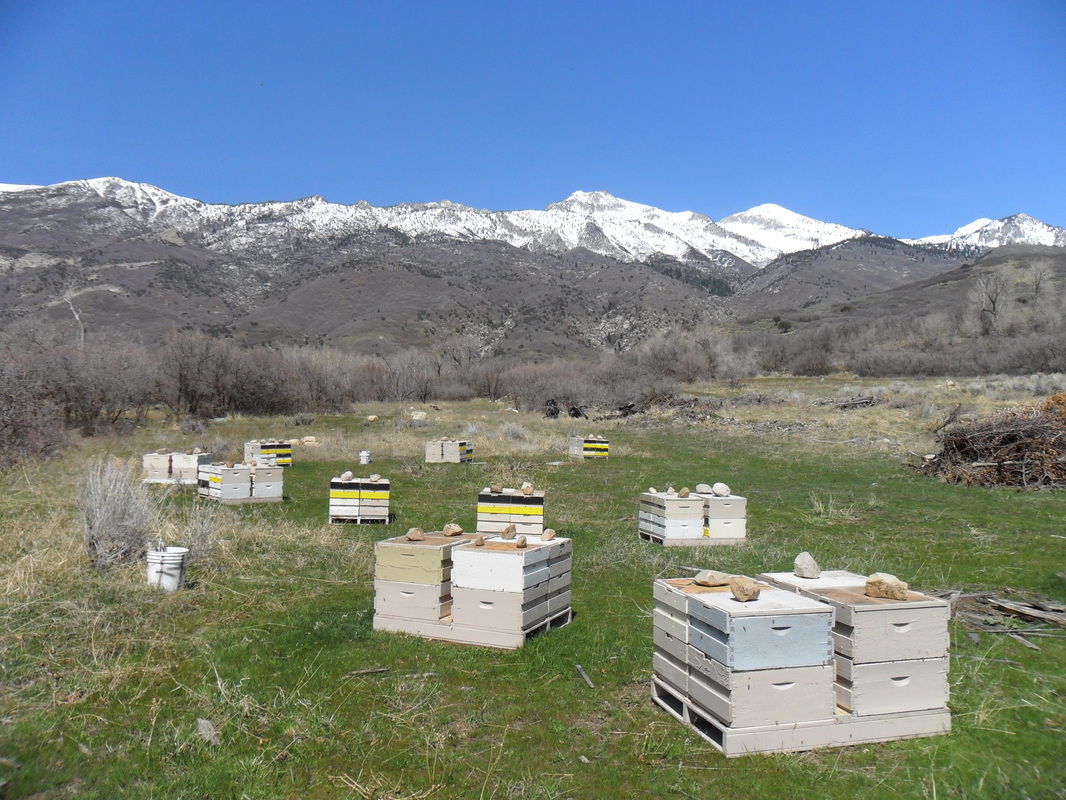
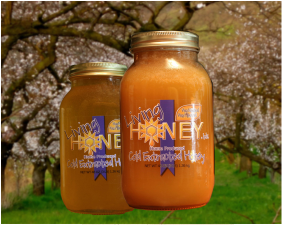
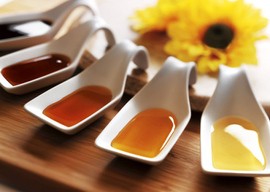
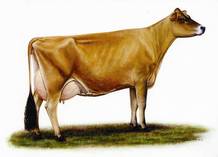
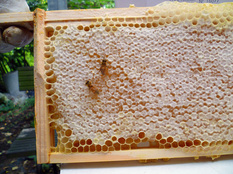
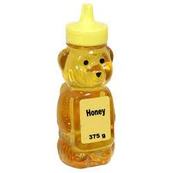
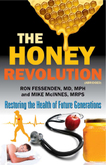
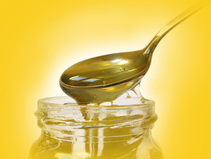
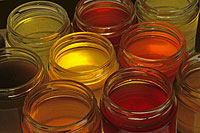
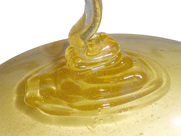

 RSS Feed
RSS Feed